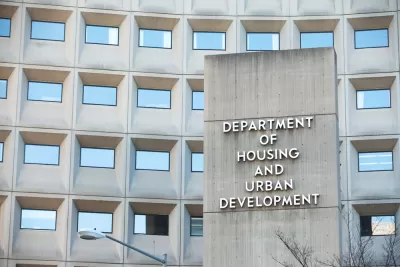A revised U.S. Department of Housing and Urban Development rule makes it more difficult to submit claims of housing discrimination when a landlord's decisions is influenced by a third-party tenant screening service.

The Department of Housing and Urban Development (HUD) changed rules regulating housing discrimination complaints to immunize landlords from discrimination charges, "if they use 'profit' as a reason for their decision-making, or if they use third-party systems to choose tenants," reports Lauren Kirchner. Among landlords, 90% use similar screening services to assess prospective tenants, according to The Markup and a New York Times investigative report.
The Trump administration's new HUD rule effectively dropping discrimination charges related to decision-making influenced by third-party screening services stirred dissent in fair housing proponents. "Even mortgage lenders and realtors eventually distanced themselves from HUD’s proposal—some of them invoking this summer’s seeds of a national reckoning over systematic racism in America," Kirchner says.
While HUD is loosening the rules for the use of algorithm-based screening systems, a groundbreaking Connecticut federal district court trial will decide whether CoreLogic, an algorithmic tenant screening services behind “CrimSAFE," is guilty of housing discrimination in violation of the federal Fair Housing Act. The case is likely the first lawsuit to target a screening company, rather than a landlord, for housing discrimination.
The algorithms behind CrimSAFE, "screens out Black and Latino applicants by relying on criminal records, and that it doesn’t give applicants the chance to explain their mitigating circumstances through more detailed, individualized assessments," explains Kirchner.
FULL STORY: Can Algorithms Violate Fair Housing Laws?

Alabama: Trump Terminates Settlements for Black Communities Harmed By Raw Sewage
Trump deemed the landmark civil rights agreement “illegal DEI and environmental justice policy.”

Planetizen Federal Action Tracker
A weekly monitor of how Trump’s orders and actions are impacting planners and planning in America.

The 120 Year Old Tiny Home Villages That Sheltered San Francisco’s Earthquake Refugees
More than a century ago, San Francisco mobilized to house thousands of residents displaced by the 1906 earthquake. Could their strategy offer a model for the present?

In Both Crashes and Crime, Public Transportation is Far Safer than Driving
Contrary to popular assumptions, public transportation has far lower crash and crime rates than automobile travel. For safer communities, improve and encourage transit travel.

Report: Zoning Reforms Should Complement Nashville’s Ambitious Transit Plan
Without reform, restrictive zoning codes will limit the impact of the city’s planned transit expansion and could exclude some of the residents who depend on transit the most.

Judge Orders Release of Frozen IRA, IIJA Funding
The decision is a victory for environmental groups who charged that freezing funds for critical infrastructure and disaster response programs caused “real and irreparable harm” to communities.
Urban Design for Planners 1: Software Tools
This six-course series explores essential urban design concepts using open source software and equips planners with the tools they need to participate fully in the urban design process.
Planning for Universal Design
Learn the tools for implementing Universal Design in planning regulations.
Clanton & Associates, Inc.
Jessamine County Fiscal Court
Institute for Housing and Urban Development Studies (IHS)
City of Grandview
Harvard GSD Executive Education
Toledo-Lucas County Plan Commissions
Salt Lake City
NYU Wagner Graduate School of Public Service





























